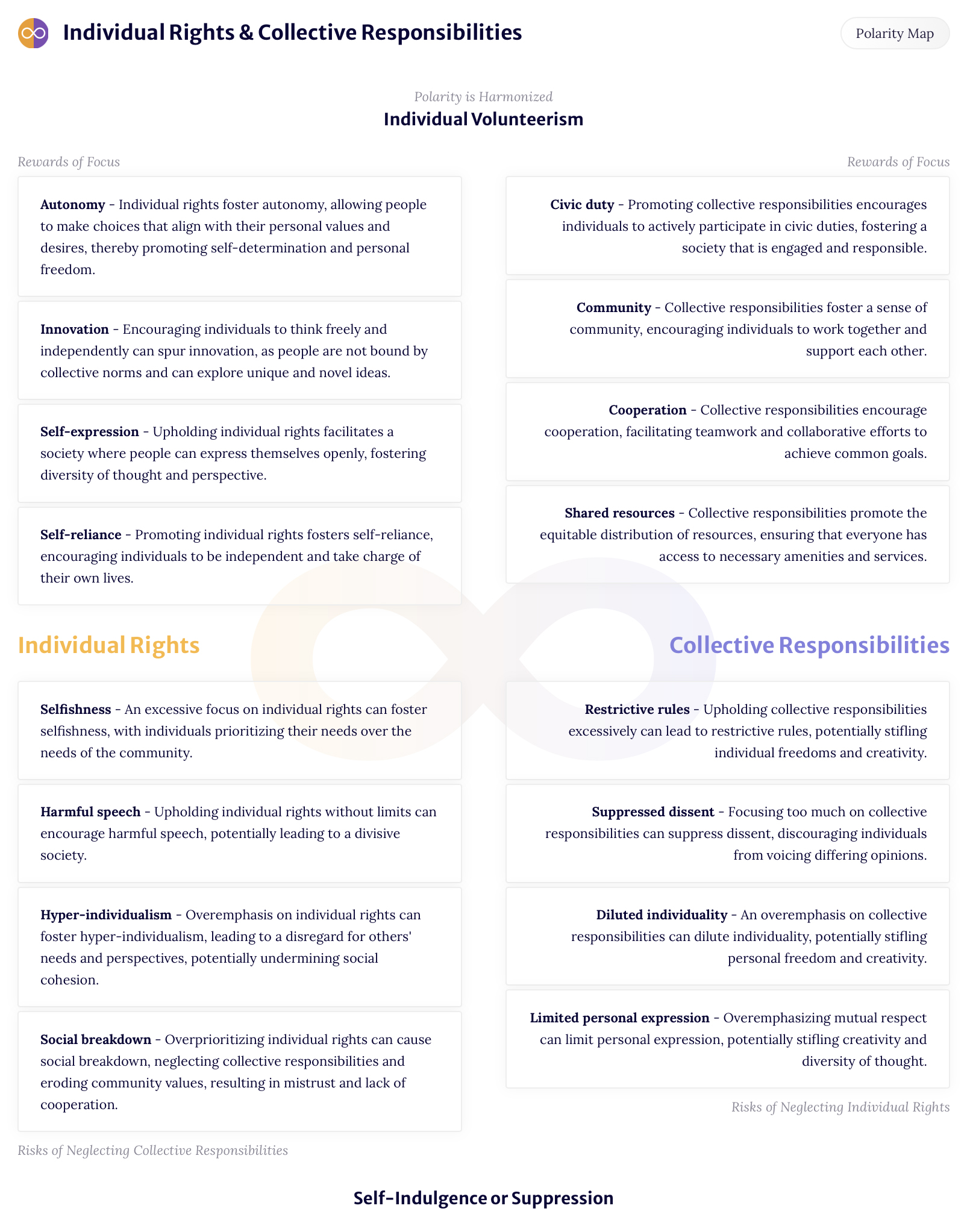INSIGHT MAP
INDIVIDUAL
COLLECTIVE
INTERIOR
EXTERIOR
- The Illusion of Moral Superiority: The belief in one’s moral superiority can blind individuals to the value of opposing viewpoints, hindering personal and societal evolution.
- The Paradox of Tolerance: Tolerance does not require acceptance of intolerance, as allowing intolerance can ultimately destroy the very foundation of tolerance itself.
- Transformation Through Openness: The willingness to be open to influence and to influence others is a crucial aspect of personal development. This openness facilitates a deeper exploration of truth and fosters a broader collective understanding and evolution of consciousness.
- The Integral Embrace of Complexity: Embracing complexity, integral thinking resists oversimplification. Fostering a rich tapestry of understanding that honors the multifaceted nature of reality.
- The Importance of Embodiment: Genuine transformation requires the embodiment of principles, not just intellectual understanding, to effect real change in individual and collective behavior.
- The Power of Dialectics: The dialectic emerges as a profound tool for human development, transcending simple conversation to become a mutual exploration of deeper truths. This engagement, characterized by mutual respect and the willingness to influence and be influenced, fosters a unique and transforming connection among individuals.
- Regressive Progressivism: Progressivism, aiming to be the cutting edge of cultural and political movements, ironically becomes regressive when it diverges from its foundational principles of openness and inclusivity.
- The Deterioration of Discourse: The widespread decentralization of media and information channels has led to an erosion in the quality of public discourse. As a consequence, the amplification of pre-rational and regressive narratives has become more prevalent.
- Inclusion and Exclusion: In the social media era, the necessity for inclusion to embrace a multitude of perspectives becomes intertwined with healthy exclusion as a defense mechanism against the deluge of pre-rational voices flooding into our discourse.
- The Chilling Effect: The increasing prevalence of investigations and disciplinary actions against professors since 2014 reveals a concerning trend towards stifling academic freedom.
- Technological Decentralization: Smartphones and the internet have ushered in an era of unprecedented information accessibility, transforming the landscape of how information is shared and consumed and reshaping the dynamics of communication, offering both opportunities and challenges in navigating the digital info ecosystem.
- Noise to Signal Ratio: Decentralization has caused a fragmentation of shared reality, leading to an overwhelming quantity of information but of significantly lower quality.
 Core Polarities
Core Polarities
 Grow Up
Grow Up
Red (self-centric): Dictate: This is where the linguistic exchange is dominated by directives, commands, and absolute assertions reflecting a strong focus on personal power, immediacy, and survival. The individual at this stage asserts their perspective forcibly, with little regard for collaborative discussion or the viewpoints of others.
Amber (group-centric): Doctrine: Communication is guided by an adherence to group norms, traditional values, and clearly defined rules. The dialogic is typically less about discovering new ideas and more about enforcing laws and order, often discouraging dissent within the group. At this stage, discourse serves to maintain stability and order, often discouraging dissent in favor of upholding the status quo and the collective’s predefined dogmas.
Umber (skill-centric): Debate: This stage is marked by a growing skill in handling abstract concepts and the capacity to take on multiple perspectives. Debates often become competitive, with a clear goal of winning or proving one’s point rather than reaching mutual understanding. The emphasis is on logical argumentation, often reliant on facts and data rather than moral absolutes. This style of discourse can lead to polarization rather than integration.
Orange (self-determining): Dialogue: This level embodies a more mature approach to conversation, where individuals recognize their autonomy and that of others, leading to more open and equitable exchanges. Dialogue at this stage is characterized by the exploration of different viewpoints, a willingness to change one’s mind, and a movement towards mutually beneficial outcomes. It is a key transitional phase, setting the stage for the acknowledgment of the multiplicity of valid perspectives.
Green (self-questioning): Discourse: Communication at this stage is deeply empathetic, valuing emotional intelligence and the relational aspects of human interaction. There is an emphasis on consensus-building, inclusion, and sensitivity to diverse individual voices and discourse with the intent to understand and honor all voices, recognizing that every contributor has a unique and valuable perspective to offer to the collective wisdom.
Turquoise (self-actualizing): Dialectic: Here the focus shifts to integrating seemingly opposing viewpoints to arrive at higher-order syntheses. This form of discourse transcends the duality of debate and the relativism of discourse. It seeks to enact an integral embrace, where various perspectives are honored and communication is marked by a profound acceptance of complexity, a systems-level perspective, and an effort to forge connections between diverse perspectives to uncover deeper principles.
 Open Up
Open Up
| Cognitive Intelligence: The ability to engage in complex thinking and understand diverse perspectives is crucial to navigating the challenges posed by cancel culture and illiberal tendencies. This line is central to developing a higher capacity for dialectic engagement and transcending polarized viewpoints. | Emotional Intelligence: Managing emotions, particularly in heated or controversial discussions, is key to maintaining constructive conversations. Emotional maturity allows for the regulation of reactions and responses, facilitating a more balanced dialogue. | Moral Intelligence: The evolution of moral reasoning, from a narrow, rigid ability to discern right from wrong plays a key role in developing the impacts of cancel culture. It influences how individuals and communities navigate the landscape of free speech and protecting against harm. |



 Insight Map
Insight Map Key Questions
Key Questions